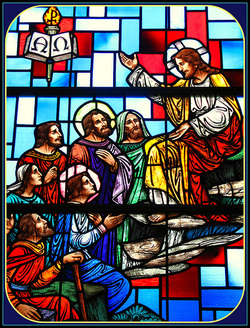Joining our local human services federation showed me that people of the world often show more compassion than church people. Public school teachers and staff rival and often exceed the passion of the church in seeing children and their parents prosper. The director of after-school programs in low-income (Title One) schools in my city asked me for help in getting churches involved in serving their families. The irony is that city and school officials often have a greater desire for churches to serve people in the community than the congregations themselves. However, believers are awakening to the call for community service. The religious leaders in Jesus’ day saw blindness in one man and questioned how he was healed. Similar, believers often don’t consider their own blindness on how God is working outside the four walls of the church to bring healing and restoration. Let’s see how religious leaders grapple with the healing of a blind man in John 9.
Jesus saw a man blind from birth as He passed by. The disciples asked Jesus if the reason he was born blind was because of the man’s or his parents’ sin. He answered that it was so God’s works could be displayed in him since we must do His works everyday to show that Jesus is the light of the world. He applied clay to the blind man’s eyes and told him to wash in the pool of Siloam. Controversy arose how his eyes were opened. The man said that Jesus made clay, anointed his eyes, told him to go to Siloam and wash, and then he received sight (John 9:1-12). Doing God’s works everyday shows that Jesus is the light of the world.
The Pharisees asked the formerly blind man how he received sight. He said this man applied clay to his eyes, washed them and now he sees. A division came between those who didn’t believe Jesus was from God because He healed on the Sabbath and those who believed because of His healing. Under further questioning, the formerly blind man said Jesus was a prophet. The parents of the formerly blind man wouldn’t tell the Jews how he now sees because they feared being put out of the synagogue for confessing Jesus as the Messiah. They said to ask their son so he could speak for himself (John 9:13-23). Confessing Jesus as the Messiah leads some to believe in Him and others to reject you.
The Jews asked the former blind man a second time to glorify God and say Jesus was a sinner. He said, “Whether He is a sinner, I do not know, one thing I do know, that, whereas I was blind, now I see.” The Jews asked him again how He opened his eyes. The formerly blind man said they weren’t listening and then asked whether they wanted to be His disciples. The Jews reviled him because they knew God spoke to Moses as his disciples, but were unsure where Jesus came from. The formerly blind man challenged the Jews to look at the evidence concerning his healing. He said that “God does not hear sinners; but if anyone is God-fearing, and does His will, He hears him. . . . If this man were not from God, He could do nothing.” The Jews put him out saying if wasn’t appropriate for a man born in sin to be teaching them (John 9:24-34). Sharing your personal testimony and God’s word boldly often leads to religious people rejecting you.
When Jesus heard that the formerly blind man had been put out, He asked if he believed in the Son of Man. He answered, “Who is He, Lord, that I may believe in Him?” Jesus said that he had seen Him and that person was talking to him now. The formerly blind said he believed and then worshiped Him. Jesus said it was for judgment He came into the world so the blind may see and those who see may become blind. When the Pharisees asked if they were blind, Jesus said they would have no sin by being blind, but saying, ‘We see,’ proves their sin remains (John 9:35-41). God uses spiritually blind and not religious people to show He is the light of the world.
We ask people to believe in Christ before they do the works of God, but the formerly blind man challenged the Pharisees to do His will first to hear Him. Could this be the way that God is working in our world today by speaking to those outside the church walls who are doing works of compassion? How could you join God in His work by working alongside a social service agency, volunteering at your child’s school or team with others for a particular cause like homelessness, child abuse, etc.







